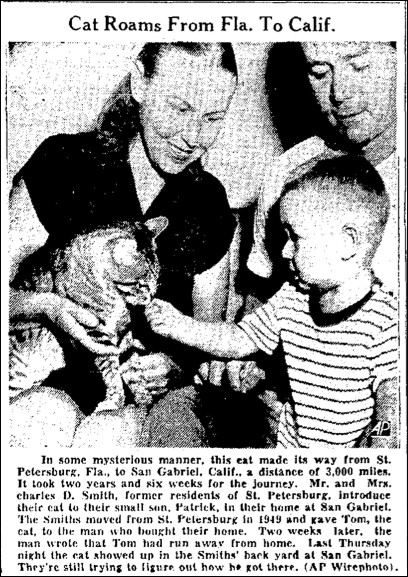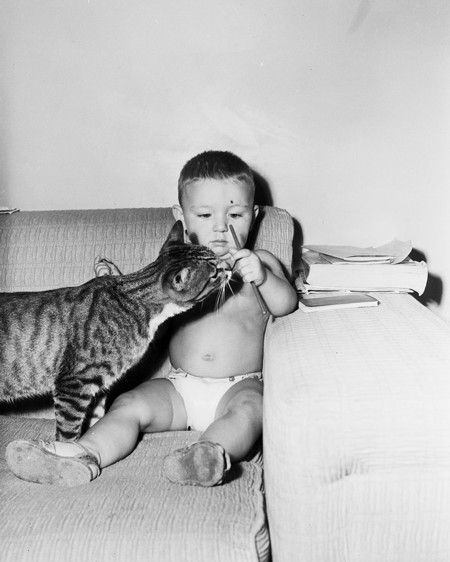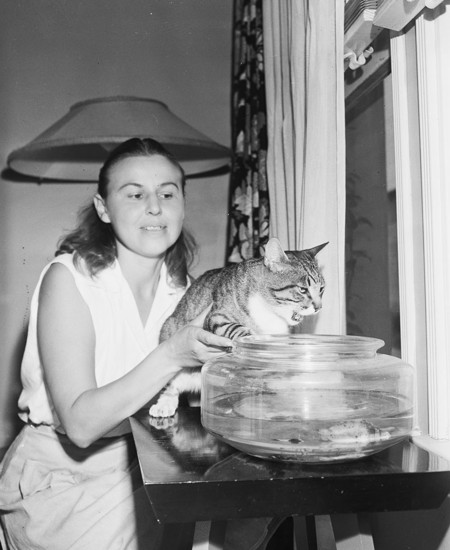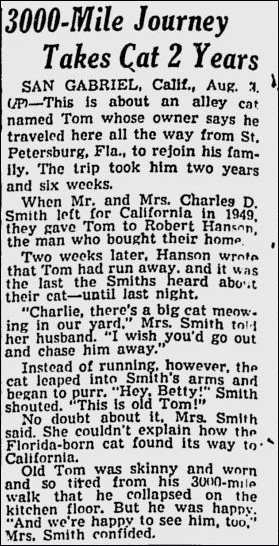In August 1951, a wire-service story appeared in numerous newspapers about a six-year-old cat named Tom that found its way back to its owners by walking across the entire United States.
Mr. and Mrs Charles Smith lived in St. Petersburg, Florida, but in 1949 they had to move to San Gabriel, California. For some reason, they couldn't take their cat with them, so they made arrangements for the man buying their house to adopt him. Two weeks after the move, they got a call from the new owner, telling them Tom had run away.
Fast-forward two years. The Smiths hear a cat meowing in their driveway. They go outside and, lo and behold, it's old Tom! Skinny and tired, but happy to see his family.
As far as I can tell, the press accepted this story at face value. Though if you think about it, the idea of it is absurd. The cat would have had to travel around 4 miles every day, having no idea where it was going, crossing deserts and mountains. I'd say that's impossible.
The more logical explanation is that a cat resembling Tom started meowing in the Smith's driveway, and the Smiths decided it was Tom. After two years, they probably only had a vague recollection of what Tom even looked like. And the press, once they got wind of the story, didn't ask too many questions. After all, why let logic get in the way of a good story!


15-month-old Pat Smith with 'Tom'

Here Elizabeth Smith is introducing 'Tom' to the fish bowl as a test.
The old Tom turned his nose up at raw fish, and apparently so did the new Tom.
(via
USC Archive)

Spokane Daily Chronicle,
Aug 3, 1951





Comments
I don't know what mechanism causes this, but birds migrate thousands of miles every year using the Earth's magnetic field, so why not also a territorial animal like a cat?
You're right! Maybe...Tom had GPS on his iPhone? Okay, you're just right. It is a really unlikely story.
"The Cambridge Declaration on Consciousness in Non-Human Animals was publicly proclaimed in Cambridge, UK, on July 7, 2012, at the conclusion of the Conference, at Churchill College, University of Cambridge, by Philip Low, David Edelman and Christof Koch. It was written by Philip Low and edited by Jaak Panksepp, Diana Reiss, David Edelman, Bruno Van Swinderen, Philip Low, and Christof Koch. The Declaration was signed by the conference participants that very evening, in the presence of Stephen Hawking, in the Balfour Room at the Hotel du Vin in Cambridge, UK. The signing ceremony was memorialized by CBS 60 Minutes"
http://fcmconference.org/
They found consciousness in, among other creatures, zebra finches which have TINY brains!
So we are still learning about animals and how they think/ sense/ interact with the world. I say if the family says it's their cat, they would know far better than we would and since even science is not clear on the nature of animals, some animals may very well be able to travel vast difference to find their loved ones.